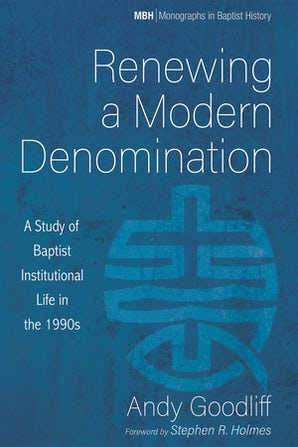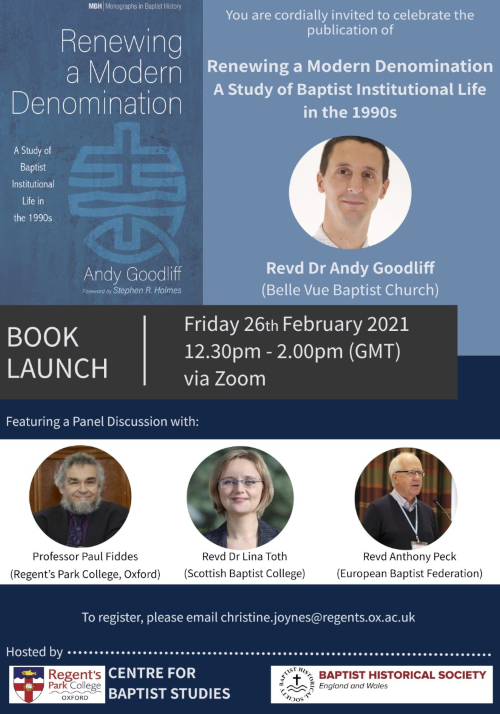'What the Baptist Union got up to in the 1990s'
Andy Goodliff introduces his new book Renewing a Modern Denomination, which explores Baptist thinking at the end of the 20th century - a period which has much to say to us now
 The end of the 20th Century was an exciting, busy time for Baptists, much like the beginning of the 20th Century. What I seek to do in Renewing a Modern Denomination is tell some of that story. The book is a version of my PhD thesis completed at the University of St. Andrews, and when people asked me what my research was about I replied, ‘what the Baptist Union got up to in the 1990s.’
The end of the 20th Century was an exciting, busy time for Baptists, much like the beginning of the 20th Century. What I seek to do in Renewing a Modern Denomination is tell some of that story. The book is a version of my PhD thesis completed at the University of St. Andrews, and when people asked me what my research was about I replied, ‘what the Baptist Union got up to in the 1990s.’
The question in the 1990s was not do we need to renew our life, it was how do we renew our life. There was a definite feeling among many Baptists that the life of the Union and the Associations, and of the churches too, needed to face up to a changing culture and the increasing impact of ecumenical, evangelical and charismatic movements. This feeling was summed up by the title of Nigel Wright’s 1991 book Challenge to Change.
Under a new General Secretary, David Coffey (to many simply DC), the Union entered a series of conversations around structures, ministry, mission and identity. Coffey’s leadership was a key impetus through this period and the book seeks to pay tribute to that. (On a side note, it is quite timely to see the book published in the same year that DC turns 80.)
The question Coffey asked of Baptists was what kind of Union for the 21st Century? In many ways we are still asking that question today. In the book I explore the impact of different voices — in particular Paul Fiddes, Brian Haymes and Nigel Wright — in the debate taking place. I focus on the ideas of covenant and mission; the new ecumenical venture; the move from General Superintendents to Regional Ministers and with that the related move from County to Regional Associations.
The story the book tells starts back in 1979, the year Margaret Thatcher became Prime Minister, but for Baptists it witnessed the birth of Mainstream (which in 2011 became Fresh Streams) and was also the occasion of a significant lecture at the Baptist Historical Society AGM. I suggest that these two events initiated two streams of thought that advocated denominational renewal (in relation to structures and programmes) and in theological renewal respectively. These streams generated ideas and support through the 1980s which began then to interact through the conversations in the 1990s. The road to renewal was a long one.
Why read this book? I believe knowing our history is vital to living our future. Hopefully you might read it to engage with the story it tells. For some it might be revisiting a decade through which you lived and participated — the Listening Days, the Denominational Consultation, the Baptist Leaders’ Day at Wembley!; for others, it is a chance to see what the baby boomers were doing! Reading through the records from those years, in The Baptist Times and the Baptist Union Council Minutes there is a sense of the excitement, the opportunity and the tension that was felt by those committed to being church in a Baptist way.
What the book also offers is an encounter with some excellent Baptist theology, which deserves not be to be forgotten, including: The Nature of the Assembly and the Council of Baptist Union (not the most exciting title, but one of the only pieces of work that seeks to offer a theological rationale for our shared life); Something to Declare (on the Baptist Union’s Declaration of Principle, which has become increasingly important); On the Way of Trust; Transforming Superintendency; Relating and Resourcing, Five Core Values; and Covenant 21.
One of the key arguments of the book is that theology matters and is vital to our being churches, associations and a Union. Church renewal needs to be accompanied by theological renewal. This was recognised in the 1990s, as the plethora of reports and articles show, but at the same time the pressure for change meant that it wasn’t always followed through. This is something I believe we still need to hear today.
The book concludes with the recognition that what it is to be Baptist is never something fixed, but always an ongoing conversation (for more on this see my article in the most recent Baptists Together magazine). Our history, and decisions made in the past, don’t define us for ever - but understanding them and engaging with them is vital to the activity of making sense of who we are today and who Christ might be summoning us to be tomorrow.
I hope reading Renewing a Modern Denomination might aid and stimulate that work.
 Andy Goodliff is the minister of Belle Vue Baptist Church, Southend.
Andy Goodliff is the minister of Belle Vue Baptist Church, Southend.
Renewing a Modern Denomination: A Study of Institutional Baptist Life is published by Wipf and Stock
There is a book launch via Zoom on 26 February (12.30-2pm), featuring a panel discussion with Paul Fiddes, Lina Toth and Tony Peck
To register email christine.joynes@regents.ox.ac.uk
Do you have a view? Share your thoughts via our letters' page.
Baptist Times, 03/02/2021